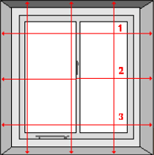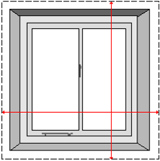How To Measure For Aluminium Venetian Blinds
What you will need:
- A metal tape measure
- Pen/pencil and piece of paper/notepad
When ordering multiple blinds at very similar widths a difference of even 1millimetre can mean a change to the number of ladder cords/tapes used as well as the position of these. Similarly, a slight difference in drop can mean additional slats covering the drop of the blind. This is important to bear in mind where blinds are to be installed in close proximity, and you want a uniform look. If your installation is like this and you need help email us for further measuring advice.
You will usually have at least 1-2 slats sitting on the base rail of the blind when the blinds are fully lowered. These slats keep the base rail flush to the windowsill when you angle the slats and ensure the full height of the window is covered.
How To Take a Recess Size Measurement

Measuring Inside The Recess
If you order you aluminium venetian blinds as Recess size we’re going to make the width of your aluminium venetian blind approximately 1cm smaller than the width you give. This is so the blind fits nicely inside your recess and the slats do not scrape against the recess walls. We leave the height as it is so the base rails sits on the window sill. It’s important that you do not make any deductions yourself.
Follow the instructions below on how to measure your window recess;
- Use a metal tape and measure in centimetres to the nearest 0.1cm (1 millimetre).
- Measure the width of the recess from wall to wall in three places as shown in the diagram above. Use the shortest measurement of the three if they vary.
- Measure the drop by taking the measurement from the top of the recess to the windowsill in three places as shown in above. Use the shortest measurement of the three if they vary.
- Write down your width and height measurement as you go to the nearest 0.1cm (1 millimetre). Clearly note which is width and which is the height. We recommend you write down the width first then the height as when you order your blinds you will always be required to enter the width first and then the height so this will help prevent any errors when you come to order.
- If there are any obstructions within the window recess, like projecting window handles or Dado Rails and you are confused about what to do just email us for advice.
- Use these measurements to order and select the Recess size option.
Child Safety
Due to Child Safety legislation, controls on all blinds must be at least 150cm from the floor so they are securely out of reach of young children. To avoid controls which are too short for you to reach, there is a section when ordering called the Installation Measurement. The installation measurement is the measurement from where the very top of the blind will be installed down to the floor. If you supply the installation measurement when ordering we will make sure your cords/chains are long enough for you to reach but still safely out of the reach of young children. We also recommend you still use the child safety devices we supply to wrap any excess cord around as an extra precaution.
How To Take an Exact Size Measurement

Measuring Outside The Recess
If you order as Exact size your blind will be made to the sizes you give to us. We do not make deductions. (We do work to an industry standard manufacturer’s tolerance of plus/minus 5mm).
Please note due to how venetians are made the height you supply is divided up between the headrail, base rail and the slat width you have selected (eg 25mm slatting). Since we cannot add a partial slat, to ensure height is covered, we sometimes have to add a whole slat eg a 25mm slat even if we are just trying to cover the remainder 10mm of a supplied height. Therefore sometimes exact venetians will be slightly longer than ordered.
How to measure for an exact sized venetian;
- Use a metal tape and measure in centimetres to the nearest 0.1cm (1 millimetre).
- Measure the exact width of where you would like you blind to cover. Allow a similar amount of overlap on each side if fitting outside of a recess, as shown above.
- Measure the exact height of where you would like the top of the blind to be installed down to where you want the blind to end. If you are installing outside of a window recess allow a similar amount of overlap at the top and bottom as shown above. Never try and fit too close to the top line of a window recess or window frame, as the plaster may crumble. We would recommend allowing at least 5cm above the top of the window to ensure secure fixing.
- Write down your width and height measurement as you go to the nearest 0.1cm (1 millimetre). Clearly note which is width and which is the height. We recommend you write down the width first then the height as when you order your blinds you will always be required to enter the width first and then the height so this will help prevent any errors when you come to order.
- Use these measurements to order and select the Exact size option.
Top Tip – if you want the appearance of the blind to look a little less random, take a look at the overlap of your window sill. If this has a generous enough overlap either side of the window recess, go ahead and mirror it!
Child Safety
Due to Child Safety legislation, controls on all blinds must be at least 150cm from the floor so they are securely out of reach of young children. To avoid controls which are too short for you to reach, there is a section when ordering called the Installation Measurement. The installation measurement is the measurement from where the very top of the blind will be installed down to the floor. If you supply the installation measurement when ordering we will make sure your cords/chains are long enough for you to reach but still safely out of the reach of young children. We also recommend you still use the child safety devices we supply to secure the chains under tension or to wrap excess cord around too as an extra precaution.
